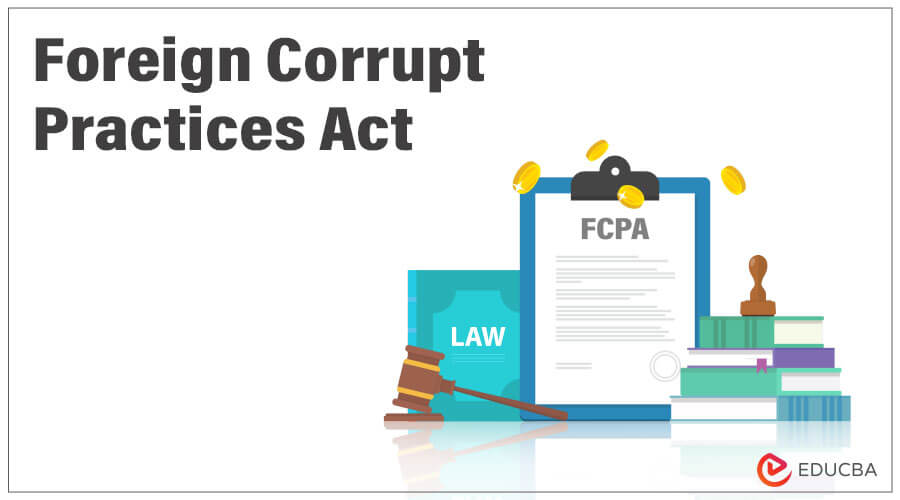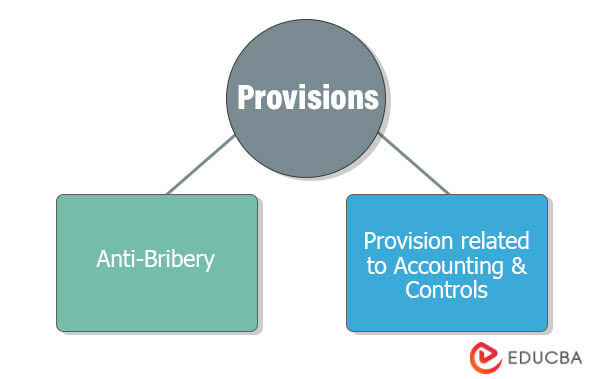Updated July 13, 2023

Definition of Foreign Corrupt Practices Act
The term “Foreign Corrupt Practices Act” refers to the US federal law that forbids US individuals and firms from bribing foreign officials to secure favorable business deals. The Act is applicable globally with a strong focus on publicly traded companies and their employees.
The Act comes within the joint enforcement of the Securities and Exchange Commission (SEC) and the Department of Justice (DOJ), which impose civil and criminal penalties on the perpetrator.
Key Takeaways
- It refers to the US law forbidding individuals and entities from bribing foreign officials to secure favorable business deals.
- There are two provisions under this anti-bribery and provision related to accounting & controls:
- The SEC and the DOJ are jointly responsible for enforcing the Foreign Corrupt Practices Act.
- The various investigations carried out by the SEC in the mid-1970s led to the Foreign Corrupt Practices Act. As a result, Congress enacted the Act, which was signed into law in 1977.
Example of Foreign Corrupt Practices Act
- Falsification of documents and transactions for concealing payments made to foreign officials or other influential parties.
- Deliberate misclassification of a bribe as other income statement line items, such as commission, marketing expense, etc.
- Reporting inflated financial figures in the company’s books and records to cover up for illegal transactions and improper movement of funds.
Now, let us look at some of the real-life examples that have taken place in the past:
- Between 1995 and 2004, Japanese firm Marubeni Corporation secured four contracts valued at more than $6 billion in Nigeria. However, investigations revealed that the contracts resulted from ~$51 million of bribes paid to Nigerian government officials. As a result, in 2012, the company had to pay a hefty penalty of ~$55 million for violating the Foreign Corrupt Practices Act while acting as an agent of the joint venture that included Technip, Kellogg Brown & Root Inc., Snamprogetti Netherlands B.V., and JGC Corporation.
Source: US Department of Justice
- Between 2004 and 2006, Hewlett Packard Company (HP) paid ~$11 million in bribes to the Prosecutor General of Russia for securing a €35 million contract for supplying computer equipment across Russia. In 2010, the DOJ and the SEC started investigating the matter. In September 2014, the company eventually pleaded guilty to violations of the anti-bribery act and had to pay a penalty of more than $100 million.
Source: US Department of Justice
Provisions
- Anti-bribery: It prohibits individuals and entities from bribing any foreign officials with money or anything else of value with the felonious intent of acquiring a favorable business deal.
- Provision related to Accounting & Controls: It makes it mandatory for corporate entities to maintain the companies’ books and records adequately and appropriately. It also requires these entities to keep adequate internal controls over the financial records.
Elements
The following five elements together constitute a violation:
- Make a direct or indirect offer or promise to pay money or something of value
- To any foreign individual, political party, candidate for office
- With a deceitful intent
- For influencing the person’s actions or decisions against his/ her legal duty
- To achieve a favorable business outcome
What Led to the Foreign Corrupt Practices Act?
During the mid-1970s, various investigations carried out by the SEC forced more than 400 companies in the US to admit that they were involved in questionable or illegal transactions with foreign officials, politicians, and political parties worth more than $300 million at that time. As a result of these high-profile revelations, the public’s confidence in the integrity of the US business system took a real hit. Hence, Congress had to restore public confidence, for which it enacted the Foreign Corrupt Practices Act to prohibit foreign officials’ bribing strongly. As a result, on December 19, 1977, the Foreign Corrupt Practices Act was signed into law, and the first criminal enforcement was against Kenny, who eventually became the first US individual to plead guilty to violating the Act.
Requirements for Foreign Corrupt Practices Act
- The Act is applicable to both US residents/ firms and foreign individuals/ firms. Further, the Act refers to the ministers of finance and doctors working in a government hospital as foreign officials.
- The Act doesn’t focus on materiality, which means the quantum of the fraud is not important, but the intent of the action is central to the Act.
- This Act requires publicly traded companies to maintain adequately transparent books of accounts and conduct internal audits at regular intervals.
- The Act forbids reimbursements about the promotion of any product.
- If a US company acquires a foreign company, the former is liable for violations committed by the acquired company even before the acquisition.
Conclusion
So, the Foreign Corrupt Practices Act can be troublesome for parties involved in illicit dealings with foreign individuals and entities. However, the Act ensures that US companies avoid acting in a manner that may be perceived as bribery. Besides, the Act also ensures that entities and individuals maintain adequately transparent books of accounts and rigorous internal control systems to avoid any fines and penalties.
Recommended Articles
This is a guide to Foreign Corrupt Practices Act. Here we discuss the definition, example, provisions, elements, and requirements. You may also have a look at the following articles to learn more –


